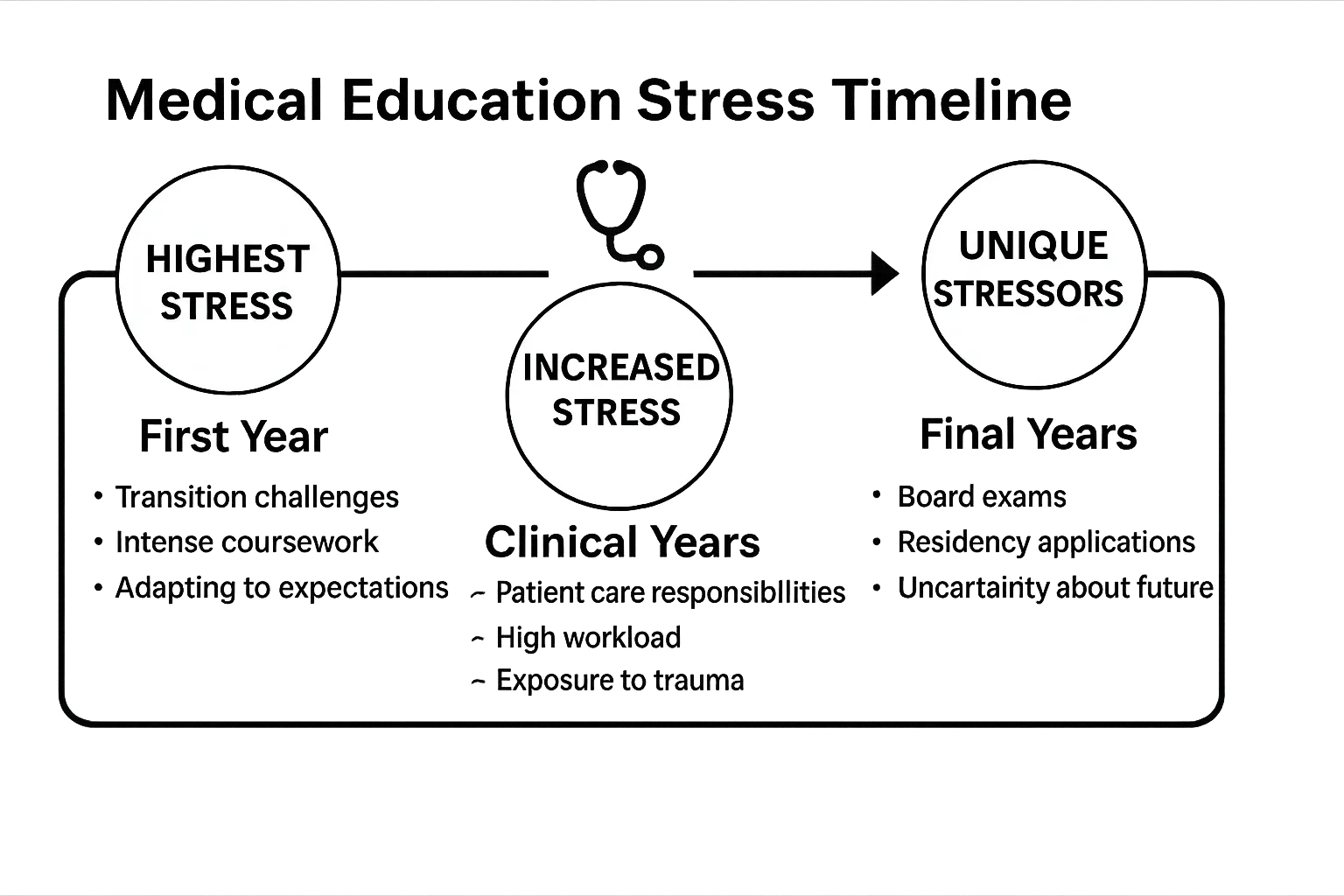
Medical education is known for its intense demands, making the amount of stress experienced by medical students much higher than that of the general population. The rigorous curriculum, relentless exams, and high expectations can weigh heavily on students’ minds and bodies. As a result, many medical students report overwhelming psychological stress, leading to issues that extend beyond the classroom and into their personal lives. Understanding and managing this stress is essential for success in medical school and for fostering future physicians’ well-being.

Stress is an inevitable part of medical school, affecting nearly every student at some point. The levels of psychological stress encountered are often greater than those seen in other university programs, with a noticeable impact on mental health, academic performance, and quality of life. Medical students commonly experience symptoms that disrupt their daily routines and their ability to manage patient care responsibilities.
This persistent stress doesn’t just pose challenges for academic achievement—it can also harm physical and emotional health. Unmanaged, it increases the risk of burnout, anxiety disorders, and depressive symptoms, which may linger throughout medical training and into professional practice.
Stress, as defined by Hans Selye, is “the nonspecific response of the body to any demand for change.” In medical education, stress becomes a constant companion for most students, fueled by relentless workloads, the need to absorb vast amounts of information, and the pressure to perform flawlessly. This psychological stress is unique because it’s not simply about time constraints or exams—it’s also about the high stakes of patient care and the expectation to always demonstrate competence.
Cultural and systemic factors within medical education often amplify stress. Many programs emphasize competition over collaboration, creating a rigid, sometimes authoritarian environment. Students may feel isolated or perceive that seeking help for mental health issues is stigmatized, which prevents early intervention and reinforces the cycle of distress.
Furthermore, the hidden curriculum—unspoken rules, expectations, and attitudes within medical school—can lead students to internalize perfectionism and fear of failure. These pressures can exacerbate feelings of inadequacy and perpetuate chronic stress throughout training.
Recent studies across the United States, including Houston, TX, show that over 60% of medical students report significant stress during their education. Surveys reveal that the amount of stress is often highest in the first three years, with a response rate among student groups exceeding 80%. These findings highlight that stress is not isolated to a few individuals but is a widespread phenomenon affecting diverse student populations.
The most common sources of stress cited by students include academic pressure, family expectations, and fear of failure. Other factors such as adjusting to a new environment, peer competition, and the need to balance personal life with professional ambitions further compound these stressors. Female students, in particular, report higher levels of psychological stress and are more likely to experience physical symptoms related to stress.
This elevated prevalence of stress among medical students is concerning, as it directly impacts their ability to learn, adapt, and provide patient care. Addressing these issues early is crucial for promoting healthier outcomes and preventing more severe mental health challenges later in their careers.

Medical students face a unique blend of stressors that stem from both academic and personal spheres. Academic achievement is a major focus, with constant exams, strict grading, and expectations to excel. Alongside this, the transition to clinical roles introduces new pressures, including patient care responsibilities and exposure to illness or trauma.
Financial burdens and the struggle to balance relationships and personal health further intensify stress. Understanding these sources is key to developing effective stress management strategies and supporting student well-being throughout the medical journey.
The sheer volume of information medical students are expected to learn is staggering. Long hours of study, frequent assessments, and the continuous push for good grades contribute to high stress levels. Academic performance becomes closely tied to self-worth for many students, making even small setbacks feel catastrophic.
With such relentless academic demands, it’s no surprise that psychological stress is a common and persistent challenge in medical education. Recognizing how this pressure manifests can help students seek timely support.
Transitioning into clinical years marks a new chapter where patient care takes center stage. Students must quickly adapt to hospital environments, deal with life-and-death situations, and face sometimes traumatic experiences. This exposure to illness, suffering, and even death can be deeply unsettling, especially for those new to clinical work.
These challenges are compounded by the need to perform under observation and learn new technical skills. Emotional resilience becomes crucial, and students must find ways to process and cope with the realities of clinical medicine.
Financial stress is a significant concern for many medical students. The high cost of tuition, coupled with living expenses and minimal opportunities for paid work, often leads to mounting debt. These monetary pressures can distract from academic focus and worsen anxiety about the future.
For some, this pressure results in neglected self-care and reduced mental well-being. Recognizing the impact of financial burdens is essential for developing targeted support systems and resources for students in need.
Juggling the demands of medical education with personal relationships and self-care is another common struggle. Many students find it difficult to maintain friendships, family ties, or romantic partnerships amidst the rigorous schedule of medical school.
This lack of balance can contribute to emotional distress and make students more vulnerable to burnout. It’s important for medical schools to foster environments that encourage healthy relationships and offer flexible health promotion programs to support students’ overall well-being.

Stress levels fluctuate throughout the different phases of medical education. Typically, the first year is marked by the highest stress as students adjust to new academic expectations and learning environments. As students progress, they may develop coping mechanisms, but stress often intensifies again during clinical years due to increased responsibilities.
By the final years, students must juggle preparing for board exams and residency, which brings a unique set of stressors. Understanding these patterns helps guide interventions at each stage of training.
For many, the first year of medical school is a dramatic transition. The intensity of coursework, the competitive environment, and the pressure to quickly adapt cause significant psychological distress. Students may struggle with time management, homesickness, and doubts about their ability to succeed.
Pre-med students can benefit by preparing for these changes in advance. Building strong organizational skills, developing effective study habits, and seeking out peer mentors can ease the adjustment process.
As students settle into the routine and gain confidence, some of the initial distress may subside. Support from faculty, student groups, and wellness programs can be invaluable in helping newcomers find their footing and develop resilience.
The clinical years bring a sharp increase in psychosocial stress. Medical students move from classroom learning to real-world patient care, often under the watchful eyes of attending physicians and residents. The stakes feel higher, as their actions can directly affect patient outcomes.
Long hours, unpredictable schedules, and exposure to trauma or death can weigh heavily on students’ mental health. Many report heightened anxiety, trouble sleeping, and difficulty processing the emotional impact of their experiences.
Adapting to these pressures requires new coping mechanisms. Building resilience, seeking peer support, and utilizing available mental health resources are all vital for maintaining well-being during this challenging phase.
As graduation approaches, the prospect of residency applications and board exams generates a different kind of stress. Students must demonstrate their academic achievement while managing feelings of uncertainty about the future. The pressure to secure competitive placements and perform well on exams can lead to sleepless nights and heightened health problems.
Effective coping strategies during this period include setting realistic goals, breaking down study tasks, and prioritizing self-care. Many programs now offer workshops on stress management, health promotion, and test-taking skills to support students.
Seeking advice from faculty mentors, joining support groups, and maintaining healthy routines can help ease the transition into residency. Proactive stress management at this stage not only benefits academic performance but also lays the groundwork for future professional resilience.

The cumulative impact of stress in medical school often manifests in both mental and physical symptoms. Students may experience anxiety, depressive symptoms, and sleep disorders, which can lead to impaired decision-making and reduced academic performance. Physical health issues such as frequent headaches, gastrointestinal problems, and chronic fatigue are also common.
Addressing both mental and physical health concerns is essential for preserving overall well-being. Timely intervention can prevent the escalation of symptoms and promote a healthier, more sustainable approach to medical training.
Medical students face a heightened risk of developing mental health disorders, including depression, anxiety, and sleep deprivation. These issues often stem from chronic stress, compounded by academic pressures and emotional exhaustion. “High levels of psychological stress may have a negative effect on cognitive functioning and learning,” as noted by Hamza M. Abdulghani.
Symptoms can range from persistent sadness and worry to panic attacks and insomnia. Many students become insomniac or hypersomniac, and sleep quality is frequently poor—especially among female students. Sleep deprivation exacerbates other mental health problems, making it harder to concentrate and increasing the likelihood of mistakes in patient care.
Early recognition and treatment of mental health issues are crucial. Students are encouraged to seek help, use campus counseling services, and practice self-compassion to prevent worsening psychological distress.
The toll of stress is not limited to emotional well-being—it can also result in significant physical health problems. Common symptoms include palpitations, altered bowel habits, chronic fatigue, and frequent headaches. Over time, these issues may evolve into more serious, long-term health risks if left unaddressed.
Recent studies show a clear association between high stress levels and the appearance of physical problems among medical students. Students with stress reported more days unable to study or work and were more likely to experience severe physical symptoms, ranging from gastrointestinal disturbances to cardiovascular complaints.
Long-term exposure to stress hormones can compromise the immune system and increase susceptibility to chronic diseases. Prioritizing self-care, engaging in physical activity, and seeking medical care when needed can help mitigate these risks.
Research consistently highlights that certain demographic groups experience greater vulnerability to medical school stress. Female students report higher stress levels and more physical symptoms compared to their male counterparts. Other factors, such as year of study and perceived health issues, also play a role.
The following table summarizes key differences in vulnerability:

Tailored mental health services and targeted support for at-risk groups are essential for reducing disparities and promoting resilience among all medical students.

Burnout is a significant concern among medical students, often resulting from persistent stress and emotional distress. Early warning signs include emotional exhaustion, detachment, and a noticeable decline in motivation or academic performance. If not addressed, burnout can lead to depressive symptoms, substance use, and even thoughts of leaving medical school.
Recognizing these symptoms early is vital. Taking action through support networks, health promotion programs, and professional counseling can prevent burnout from derailing both personal well-being and academic achievement.
Emotional exhaustion is often the first indication of burnout. Students may feel drained, irritable, or unable to engage emotionally with patients or peers. This loss of empathy is a warning sign that stress management strategies are urgently needed.
As emotional exhaustion progresses, detachment may set in. Students might withdraw from relationships, lose interest in academic or extracurricular activities, and feel disconnected from their goals. The risk of burnout increases when these feelings are ignored or dismissed.
Addressing these symptoms early through self-awareness, mindfulness practices, or seeking support from mental health professionals can prevent further decline and restore a sense of balance.
Another critical sign of burnout is a noticeable drop in academic performance and motivation. Students may struggle to concentrate, forget previously learned material, or lose the drive to succeed. This decline isn’t just about grades; it also reflects a deeper struggle with chronic stress.
Recognizing the connection between falling motivation and stress is essential. Students experiencing these symptoms should seek help from faculty advisors, peer groups, or counseling services before problems intensify.
Prompt intervention can reverse declining performance by providing strategies for managing workload, setting realistic goals, and rebuilding confidence. Open communication and support are key in addressing both the academic and emotional roots of burnout.
Early action is crucial to preventing long-term consequences of burnout. Health promotion strategies—such as regular self-care, maintaining healthy sleep patterns, and participating in stress management workshops—can greatly improve long-term well-being.
Students should be encouraged to access well-being resources and not wait until a crisis occurs. Many medical schools now offer burnout prevention programs, counseling, and peer support networks as part of their health promotion initiatives.
Timely intervention not only helps students recover from current symptoms but also builds resilience for future challenges. Establishing healthy habits and support systems during medical school lays the foundation for a sustainable and fulfilling career in medicine.
Understanding the difference between stress and burnout is essential for medical students and educators alike. While stress is a common and often manageable response to challenging situations, burnout is a more severe, long-term condition resulting from unrelenting psychological stress.
Recognizing the distinct symptoms and progression of each allows for more effective intervention. Addressing stress before it escalates to burnout is key to sustaining mental health and academic achievement throughout medical school.
Stress and burnout share some similarities but differ in important ways. Stress is typically characterized by over-engagement, urgency, and anxiety, while burnout involves emotional exhaustion, cynicism, and a sense of inefficacy. Over time, unmanaged stress can evolve into burnout, with more serious consequences.
Clear distinctions enable students and faculty to tailor interventions that address each condition effectively.
Managing stress and burnout requires different approaches. Stress can often be controlled through targeted interventions, while burnout demands more comprehensive recovery strategies, including professional help and lifestyle changes.
Recognizing when stress has escalated to burnout helps students seek the right level of support and avoid long-term health and academic consequences.

Implementing effective stress management and coping strategies is crucial for medical students aiming to succeed in a demanding environment. Techniques such as mindfulness, exercise, and good nutrition can significantly improve resilience and help maintain a healthy balance between responsibilities and self-care.
Participation in health promotion programs, regular self-reflection, and open communication with mentors further support well-being. Empowering students with coping skills early in their education lays the groundwork for ongoing mental and physical health.
Mindfulness and relaxation techniques have proven to be powerful tools for stress management in medical education. Practicing mindfulness helps students remain present and reduces anxiety by allowing them to focus on one task at a time. Meditation and breathing exercises offer practical ways to reset and recharge during busy schedules.
Incorporating mindfulness into daily routines not only enhances academic performance but also supports long-term emotional well-being.
Effective time management allows students to balance heavy academic workloads with personal life. Prioritizing tasks helps prevent last-minute stress and reduces the risk of burnout. Students who develop solid organizational habits often find it easier to manage competing demands.
Mastering these skills not only improves academic performance but also provides more opportunities to engage in health promotion and leisure activities.
Maintaining physical health is a cornerstone of stress management. Regular exercise, balanced nutrition, and sufficient sleep play crucial roles in promoting resilience and overall well-being. Neglecting these aspects can lead to sleep deprivation, mood disturbances, and diminished cognitive function.
Medical students are encouraged to make physical activity, nutrition, and sleep a regular part of their routines to combat the adverse effects of stress.
Accessing mental health services is an important aspect of coping with medical school stress. Many students are hesitant to seek help due to stigma, but early intervention can prevent more serious mental health problems.
Evidence-based programs within medical schools, such as wellness workshops and peer counseling initiatives, have demonstrated success in improving students’ mental health and resilience.
Strong social support is a critical buffer against the pressures of medical education. Peer groups, student organizations, and faculty mentorship all contribute to a sense of belonging and shared experience, which can help reduce feelings of isolation and anxiety.
Connecting with others—whether through formal student groups or informal friendships—provides emotional validation and practical advice. These networks are essential resources for maintaining mental health and building lasting resilience.
Peer support groups and a vibrant medical school community can make a significant difference in how students cope with stress. Sharing experiences with peers who understand the demands of medical school fosters empathy, encouragement, and solidarity.
These collaborative environments cultivate a culture of mutual support, helping students navigate the uncertainties of medical education together.
Support from faculty members is vital for student success. Structured mentorship programs and guidance initiatives connect students with experienced professionals who can offer advice, encouragement, and perspective.
By fostering open communication and accessibility, mentorship programs help students feel seen and valued, reinforcing the importance of well-being in medical education.
Numerous institutions now implement evidence-based programs aimed at alleviating the levels of stress experienced by medical students. These programs focus on promoting mental health through workshops, health promotion initiatives, and wellness resources tailored specifically to the medical education environment. Recent studies highlight the effectiveness of such strategies in reducing emotional distress and enhancing academic performance, especially among first-year and female medical students. By addressing the psychosocial stressors unique to medical training, these initiatives significantly contribute to improving the overall quality of life for students as they navigate their educational journey.
A variety of wellness programs and workshops are offered at Texas medical schools to combat the high levels of stress experienced by medical students. These initiatives focus on mental health promotion, addressing issues like depressive symptoms and emotional distress. Students participate in activities such as mindfulness training, physical activity sessions, and stress management workshops. Such programs not only improve the overall quality of life for students but also aim to enhance academic performance and reduce the risk of burnout, creating a supportive environment for future medical professionals.
Accessing on-campus mental health resources plays a crucial role in supporting medical students' well-being. With the increasing levels of stress during medical education, institutions have recognized the importance of providing easy access to mental health services. Programs often include counseling, workshops, and support groups designed specifically for the unique challenges faced by medical students. Recent studies highlight that timely intervention can significantly enhance students’ quality of life, reduce depressive symptoms, and counteract the risk of burnout, ultimately fostering a healthier academic environment.
Navigating the challenges of medical school demands a multifaceted approach to stress reduction. Emphasizing institutional and evidence-based programs ensures that medical students have access to effective resources that directly address their mental health needs. Strengthening support networks among peers and integrating wellness initiatives into the curriculum can substantially enhance academic performance while mitigating the levels of psychological distress encountered. Prioritizing mental health is essential not only for personal well-being but also for fostering competent future medical professionals capable of providing quality patient care. The journey may be arduous, yet resilience is attainable.
Riaz Counseling accepts insurance from various providers in Texas, including BCBSTX, Optum, Magellan, Aetna, and Cigna. This accessibility allows students seeking mental health support to utilize their insurance benefits effectively while managing stress during medical school.
Early signs of struggling with medical school stress include persistent fatigue, difficulty concentrating, increased irritability, changes in sleep patterns, and withdrawal from social interactions. Recognizing these symptoms early can help you seek support and implement effective coping strategies to manage stress.
Houston's medical schools offer several programs aimed at stress management, including mindfulness workshops, peer support groups, and access to counseling services. These initiatives are designed to enhance student well-being and resilience, providing essential tools for coping with the rigors of medical education.
If you feel that you or someone you know, may benefit from therapy, please reach out to our office for a FREE 15 minute consultation: LINK.
Stay informed about the latest research in psychology.
.png)
Explore how Internal Family Systems (IFS) therapy heals trauma and restores self-leadership.
.png)
Explore how Internal Family Systems (IFS) therapy heals trauma, anxiety, and inner conflict.
.png)
A practical guide to recognizing, preventing, and healing teacher burnout in Houston schools.